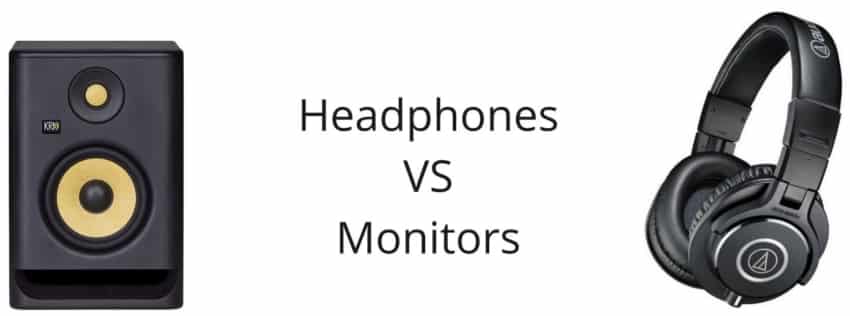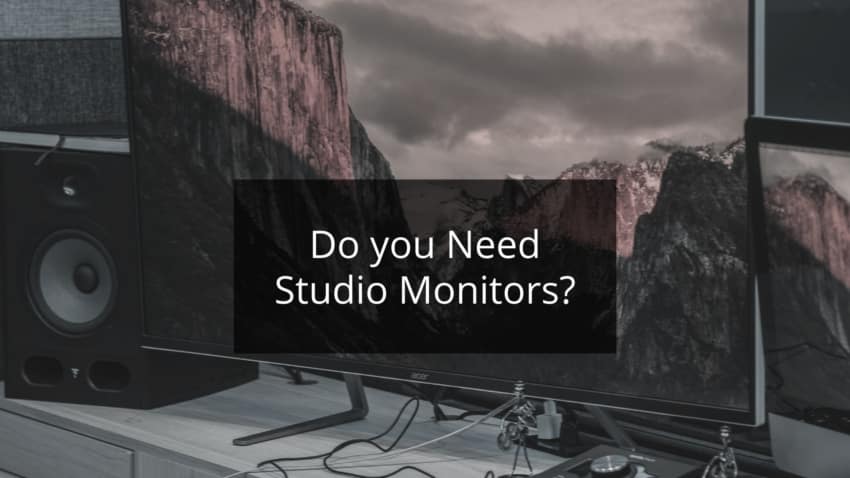Last updated on December 31st, 2023 at 06:04 pm
You’re thinking about getting some studio monitors but you wonder if you really need them in order to record and mix music, since most of the times you will be listening to music on headphones or HiFi speakers anyway.
So, why on earth would you need to purchase studio-grade monitors when you can mix on the same exact equipment that is used to listen to music?
This is what I will try and answer in this post…
Do I need Studio Monitors for a Home Studio?
Yes.
Studio monitors are designed to highlight everything that is going on in your mix, both good and bad, to let you objectively decide what needs to be adjusted in order to make it sound better.
If you want to be able to create high-quality music, then owning a pair of studio monitors is a must.
Now, that was the short answer, however there’s a lot more to it.
Why use Studio Monitors?
The whole point of using studio monitors is to be able to hear every single detail in your mixes; what frequencies are poking their head out, if there is muddiness in the low end, if there is good stereo separation, if there is some harshness going on in the high end, etc.
Not only that, but they have a flat sound signature, which simply means that they don’t have any EQ bumps or cuts to sound better like other systems do; quite the opposite in fact, since studio monitors don’t tend to sound that pleasing to begin with.

All of this means that whatever you hear coming out of your monitors is going to be as accurate a representation of how the original source actually sounds as possible, without enhancing it in any way.
In other words, they are sonically neutral.
This helps your mixes to translate better into the real world, meaning that when you play them in your car, or any other regular audio system, they will sound good.
Can I mix on HiFi Speakers?
While you definitely can, especially if you’re just starting out and don’t have the budget to purchase studio monitors, the issue with them is that they are not sonically neutral.

Most HiFi speakers tend to boost the bass and high frequencies in order to make the sound more pleasing, which is obviously great if you plan on using them for that purpose; however, since they are adding EQ to the sound, mixing on them won’t give you an accurate representation of how your mix actually sounds.
Not only that, but your songs won’t translate into the real world for the simple reason that once you play them in your car, or any other system that is different from the one you own, it will probably sound extremely dull, since you overcompensated by lowering the bass and high frequencies too much.
Note: One could make the argument that if you get used to mixing on HiFi speakers and really know how music is supposed to sound on them, then you could actually produce music that can translate pretty well, but this is far from ideal.
Headphones VS Studio Monitors

If you read any of my mixing guides, then you probably know that I don’t have anything against mixing on headphones and I think that it can absolutely be done.
However, mixing on studio monitors offers a couple clear advantages that headphones simply can’t match:
Stereo Separation
It’s far better to listen to the mix on studio monitors to check whether or not every instrument is sitting properly in the stereo field.
The reason for this is that you will hear the right channel (right speaker) mainly in your right ear, but also in your left one, plus you will also pick up all the reflections going on in the room.
This is most likely how the listener will be listening to the song and it will give you a much more realistic representation of what is going on.
With headphones, on the other hand, you will only hear the right channel in your right ear and the left one in your left ear, with no crossover whatsoever.
It’s really easy to think that you panned every instrument correctly and that they cut through the mix itself when listening on headphones.
Basically, if it sounds good on studio monitors, it will sound good on headphones, but not the other way around.
They sound Flat
Studio monitors can actually be flat sounding, but there are no truly flat headphones out there.
All headphones, even open-back ones that were specifically designed for mixing, have some sort of sonic signature that affects the sound.
This is why you’ll get a much more accurate representation of how the mix really sounds on monitors.
Now, headphones definitely have their place in the studio, and not just for recording but also for mixing:
Finding Pops and Clicks
Headphones are excellent at revealing pops and clicks, or any other unwanted noises that need to be removed.
This is why you can’t just mix on one or the other; both have their place and serve a different purpose.
Are Studio Monitors good to listen to music?
Short answer: Yes.
Long answer: It depends.
It depends because since HiFi speakers are designed to make music sound more pleasing, then one can assume that it won’t sound as good on studio monitors.
This is somewhat true, but remember that studio monitors are specifically designed to sound flat and to give you an accurate representation of what’s going on.
Honestly, I prefer to listen to music on good HiFi speakers, but this all depends on your personal taste, since you may like the flatter sound.
How many studio monitors do You need?
I’m sure that this question has at some point crossed your mind, especially because in most professional studios you can see a couple sets of speakers.
And this begs the question; How many do you really need?
For any Home studio it’s essential to have one pair of monitors, but it’s not necessary to have any more than these.
In fact, one could argue that having one pair of studio monitors and then some other commercial audio system to check how the mixes sound in a real-world environment, may be more beneficial.
Of course, headphones should be a priority as well, especially if you already have one set of speakers. Don’t purchase another set, instead get some high-quality headphones.
What Studio Monitors to get if you’re on a budget
I have three recommendations to make here, and all of the speakers I recommend will be budget friendly, since I assume that anyone reading this post won’t be interested in spending $500 for a single monitor.
My first choice would be the Presonus Eris e4.5; these aren’t the cheapest, but I think that they are the best budget ones out there, at least as far as cost-efficiency goes.
The second recommendation are the Presoun Eris e3.5, which are the e4.5’s smaller brother.
These are a lot more affordable, but also don’t sound AS good.
Lastly, the Adam Audio T5V, which are priced a bit higher than the Eris e4.5 and sound absolutely fantastic.
Conclusion
Studio monitors are probably one of the best investments you can make for your home studio, but they aren’t absolutely necessary like and Audio Interface or a Microphone, since you can’t even record if you don’t have at least one of them.
If you don’t have any money to spend, use your HiFi system until you can save up for something like the Presonus Eris e3.5, which are extremely affordable.
My personal recommendation would be to get the Presonus Eris e4.5, since they offer the best quality-to-cost ratio.
I hope this information was useful.
Have a wonderful day!
